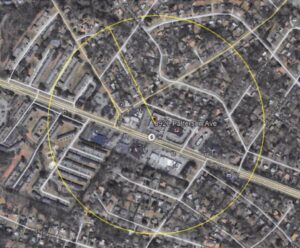
Big brother Google is watching you. Back in October, 2018, Forbes reported that a Virginia court had authorized the FBI to use a “reverse location” warrant to try to solve a series of crimes in Henrico County, Va. This warrant, also known as a geofence warrant, allows police to compel Google to provide all cellphone activity for all people in a general area over a specified period of time. The resulting handover of data includes locations and other information on potentially hundreds, if not thousands, of people. While Google has complied with the warrants in the past, it is unclear whether the company complied in the Henrico case.
In for a dime, in for a dollar. The situation in Henrico County involved a series of crimes committed against a specific Dollar Store on Patterson Ave. Unidentified armed criminals robbed the Dollar Store on four separate occasions between March and September, 2018. Additionally. the store manager was robbed while dropping off money at a night-deposit box at a Wells Fargo bank down the road. The Forbes article states, “The warrant asks for location histories held by Google for anyone within three separate areas—including regions around the Dollar Tree store and the Wells Fargo address—during the times and days the five robberies took place. The FBI also wanted identifying information of Google account holders in those areas, two of which had a 375-meter radius. The other had a 300-meter radius.” For some reason, no records were returned in conjunction with this warrant. Google may have appealed. Neither prosecutors nor Google were willing to comment. However, in other cases around the country, these warrants have been used and data has been provided.
Can I borrow your car? In a Phoenix suburb police used a “reverse location warrant” to try to solve a murder. A hazy security video showed Joseph Knight being shot and killed by an assailant in a white Honda Civic. The video was not clear enough to make out the suspect or the license plate number. Enter the “reverse warrant.” Police served Google with a geofence warrant and Google provided the data. Lo and behold, a man named Jorge Molina was put on the scene by the Google data. Molina lived two miles away and owned a white Honda Civic. Molina was arrested for the murder and taken to jail. An open and shut case? Not so fast. After a week in jail police realized that Molina wasn’t the shooter based on an alibi witness and an Uber receipt. Police also found out that his mother’s ex-boyfriend, Marco Gaeta, sometimes used Molina’s car. Gaeta was arrested for another homicide in California and will eventually be extradited to Arizona for trial in the slaying of Joseph Knight.
Growing like a weed. Knowing the number of “reverse location warrants” nationally is a challenge. Search warrants are not always public information. Sometimes they are sealed by the courts and sometimes they are misfiled. However, in Minnesota the Google “reverse location” warrants that can be found show their growth. Authorities issued their first geofence warrants to Google in September, 2018. By Feb, 2019 22 of these warrants had been issued. Geofence warrants have been found in Maine and North Carolina in addition to Minnesota and Virginia.
Orwell was an optimist. There is a long list of problems with geofence warrants. The most obvious is the Fourth Amendment to the US Constitution which reads:
“The right of the people to be secure in their persons, houses, papers, and effects, against unreasonable searches and seizures, shall not be violated, and no Warrants shall issue, but upon probable cause, supported by Oath or affirmation, and particularly describing the place to be searched, and the persons or things to be seized.”
Where is the probable cause for the seizure of data from innocent people who just happened to be in a particular place over a period of time? It would be great to hear from the attorneys who frequent this blog: Do these warrants even sound constitutional? Another problem is that the data becomes public information once the investigation is closed. As the Naked Capitalism article states:
“And another wee problem, from the MPR News story:
Don Gemberling, an attorney who managed data practices issues at the Minnesota Department of Administration for more than 30 years, pointed to another consequence of these data sweeps: once the investigation is closed, all the data law enforcement collects become public information.
“That’s probably something that we’re going to have to navigate in the near future,” said Bruley. He said all the data are saved as part of case files.”
Virginia’s political class.
Where are the members of Virginia’s General Assembly on the question of “reverse location” warrants? Where are the member of Virginia’s congressional delegation on this issue? These warrants have already been issued in Virginia. Do our elected officials believe these warrants are a legitimate law enforcement tool or an unconstitutional violation of privacy? Tim Kaine? Mark Warner? Mark Herring? Anybody?
— Don Rippert

Leave a Reply
You must be logged in to post a comment.